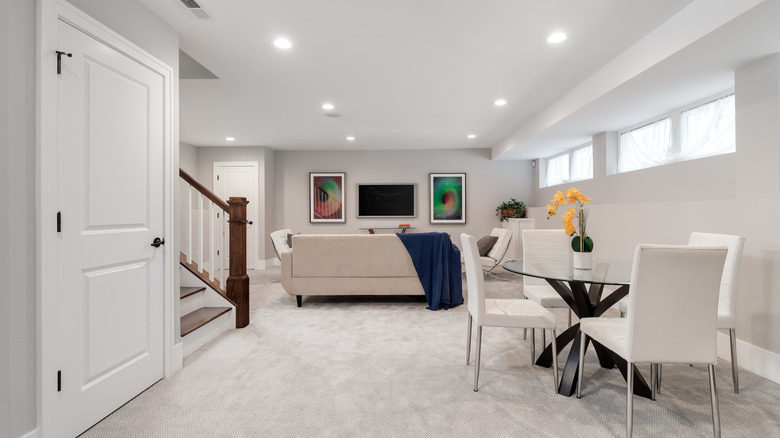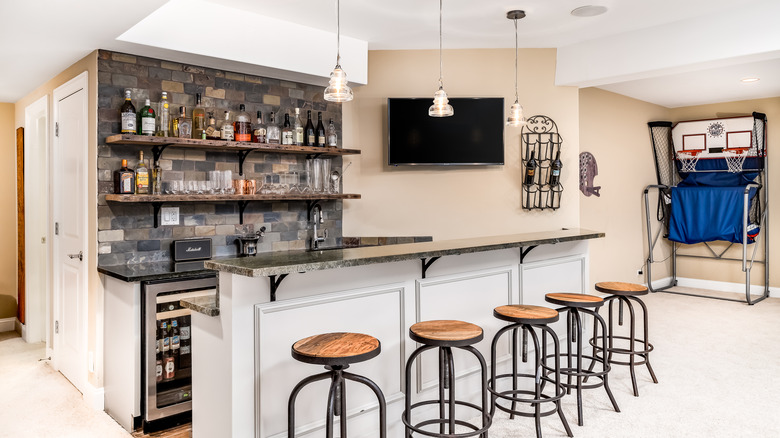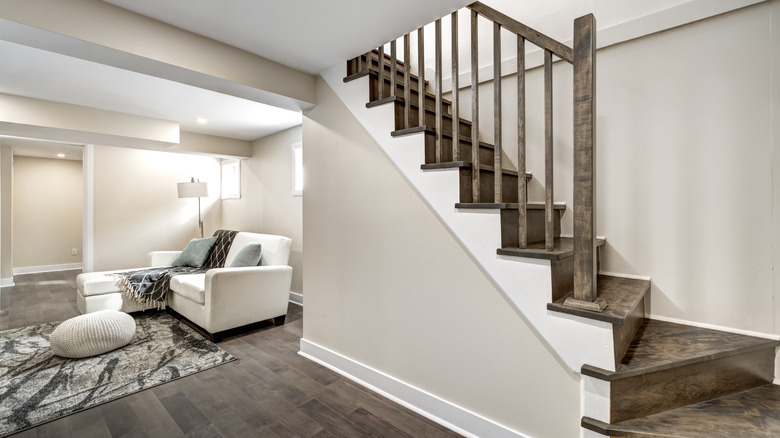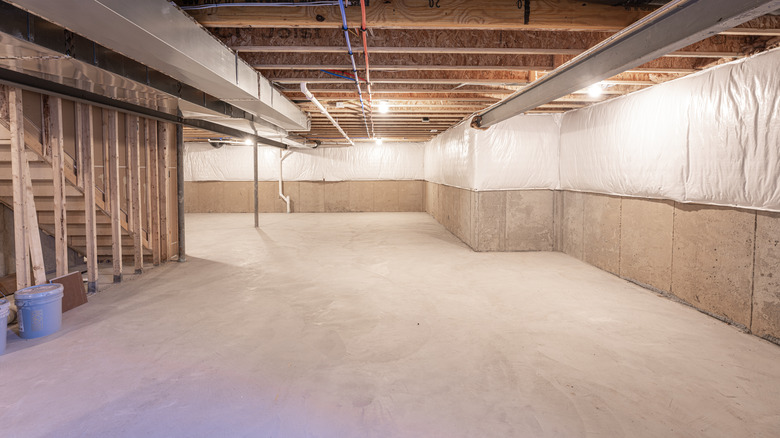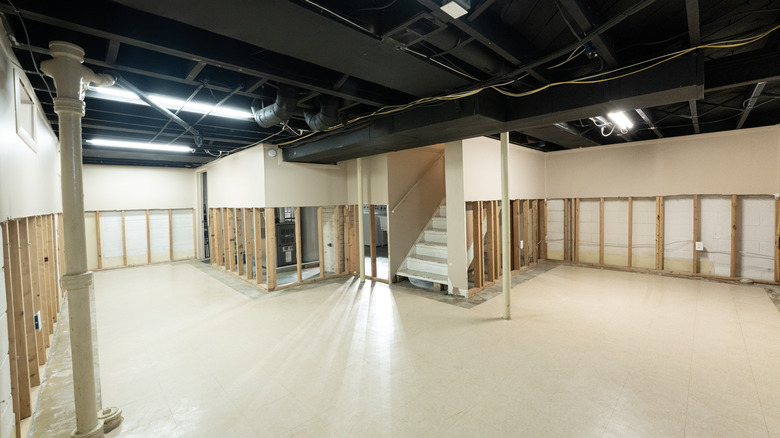How Much Does It Actually Cost To Renovate A Basement?
Basements are a source of amazing, untapped potential in many homes because most homeowners often leave these spaces exactly the way they are for years at a time. Serving as the laundry room, storage room, and perhaps as a workout area or tool shed, the basement spends much of the day unused.
But you can transform this area of your house into an integral component of the overall home. With a little imagination, incorporating this fantastic space into your property's routine flow is much easier than you might think. Finished Basements & More notes that your underground area can serve as a storage feature but also as a library, game room, wine or root cellar, den, game room, or home bar. The ability to tailor this typically expansive space to your specific interests and needs makes an unfinished or unpolished basement a gem in the overall structure of a home.
GOBankingRates reports that a basement renovation can range from around $12,230 to $33,240 and will generally recoup around a 70% return on investment. This places the basement within the same category as many other high-value home improvement projects.
Factors for cost
Construction costs will make up the bulk of the expense when renovating the basement. When finishing this home section, you'll need to fabricate internal walls, but you might also need to tackle structural support, a new egress point, and other features of a modern basement.
Foundation requirements
Your existing basement forms a part of the foundation for your home (via Angi). You may not need to do much to prepare this lower floor for the transformation, but it's a good idea to speak with a contractor to ensure that the foundation will be able to support the live load that comes along with the typical daily activity. This shouldn't be much of an issue, but if your basement exhibits any cracks in the floor or walls, then shoring up the foundation before you go about converting the space into a lived-in area of the home is a must.
Flood and moisture proofing
GOBankingRates notes that flood-proofing is an essential task for homeowners looking to convert a basement into a part of their standard living area. Repairs after a flood can cost tens of thousands of dollars, leaving you in a horrible financial bind. In addition, significant storm activity can cause minor or even major flooding in improperly sealed basements all over the United States — it isn't just the textbook flooding events that can threaten basements.
Taking the time to ensure that your new living space is able to handle the pressure that comes along with some of the more extreme weather events in your local area is an essential step when renovating the basement. GOBankingRates notes that this can cost anywhere between $5,000 and $20,000, depending on the size of your space, but the added expense is certainly worth it.
Flooring, walls, and windows
You'll need to finish the walls and floors to transform a basement into a living space. Many of these areas sport bare walls and a concrete layer underfoot. These are fine for a space that's only being used for storage or laundry capabilities, but this won't cut it when working to change it into a bedroom, home office, or living room area. Fortunately, in an unfinished basement, you likely have the ability to craft interior walls in any configuration that suits your needs. Walling off a bedroom, new storage area, or home theater will quickly change the open basement into a nearly ready space to host the routines of your life.
You'll also need to focus on the floor. Because of the proximity to the water table beneath your home (relative to the ground floor), it's best to make use of vinyl flooring or tile in basement spaces, Basements Plus recommends. These flooring options are waterproof and, therefore, won't need to be torn up and replaced in the event of a water leak or full-scale flood. Lastly, it's a good idea to install windows in areas that will serve as living spaces. Adding this final touch brings the ability to infuse the space with fresh air from outside and adds essential natural light that livens up the room.
Access and egress
Obviously, you'll need to get into and out of the basement. When renovating the space, it may be beneficial to take a look at the stairs leading down to the lower level. An unfinished basement may use somewhat barren-looking stairs, and adding carpeting to the treads or replacing the feature can give you a new look and feel as you enter and exit the lower level.
Early Experts reports that the average cost to install a new set of stairs is $2,020. In addition, many basements include a second egress point, and depending on the construction you are undertaking, local regulations may stipulate that you add this second point of access.
Additional costs
In addition to the building costs, finishing a basement renovation means bringing in lifestyle elements and appliances. As well, there are a few administrative details to account for during a basement renovation.
Permits can add a noteworthy expense
When adding space to the home or reimagining an existing space with substantial alterations to the structure, it's more than likely that you'll need to apply and pay for a permit from your local authority. This step is added to major renovation projects to ensure that the house remains safe and structurally sound throughout the building process as well as after the final piece has been laid.
Typically, you won't run into any real pushback in the permitting stage, but you may have to go through a series of inspections before and throughout the build. This is why working with a contractor on any substantial remodeling project is always a good idea. Your contractor will be able to handle the planning and permitting needs of the job for you and navigate the site visits that may be required. Angi notes that permits average around $1,330. The added expense isn't enormous in the grand scheme of a major renovation, but it's something that you can't work around.
Pre-construction preparations may be significant
If you have to shore up the foundation or demolish existing components within the basement before work can commence, you may be looking at a moderately higher expense and a larger timeline for project completion (via Angi). Preparations are crucial and can't be skipped. This step will set the tone for the overall build, so taking the time to ensure that your home is ready for the project should be a high priority for you and your contractor.
Likewise, in the lead-up to the build, you'll need to bring materials and tools into the space. The nature of where your basement is located concerning the home's overall structure can make for a slower pre-construction process. Accounting for this will keep you on track and reduce any stress that unexpected setbacks or realizations can cause.
Outfitting the new space with furniture and appliances should be considered in advance
Once the build is complete, you'll need to furnish the new space with appropriate furniture and, perhaps, entertainment equipment. The area will likely need tables, chairs, a couch, and more for a gathering point. As a bedroom, you'll have to add a bed and other essentials to the room. Many homes incorporate televisions and other electronic equipment into many areas of the property as well. Before you dive into the renovation, consider your uses for the space and budget for the addition of essential furnishings once the remodel has been completed.
Why you need a basement renovation
Renovating the basement gives you a wealth of options when it comes to making use of the additional space. Homeowners who suddenly need to carve out a new bedroom or office can benefit immensely from this project, but functional requirements aren't the only reason why you should consider making the basement a priority in your remodeling to-do list.
Remove yourself from the noise of the main house during the workday
Many employees are working from home. A report from the Pew Research Center makes a note of the substantial uptick in remote employment and the overall sentiment regarding a permanent shift toward this environment and arrangement. In addition, many people are finding the ability to spend more time with their loved ones to be a breath of fresh air.
But working from home can have a significant dampener placed on it when the kitchen table becomes your office. Carving out a space in the home to dedicate to your work environment can help you focus on tasks that must be completed while also giving you the ability to turn off at the end of the day and make your microscopic commute back to the primary living area of your home.
Make space for additions to the family
Whether you're adding new children to the family or making space for a parent or in-law, the ability to transform a basement into a new component of your home's living space is a great asset.
The AARP reports that more adults are moving in with their (adult) children in the present marketplace. While this phenomenon is a long-trending issue, it remains something that happens out there until it comes home to your family dynamic. If you suddenly need to accommodate an in-law or parent, renovating the basement can be a uniquely effective approach to the new spatial constraints on your household.
The same goes for a new child. Reimagining the bedrooms to account for a new baby (and the successive stages of life that the child will progress through) can be made far easier with the help of a basement space that's tailor-made for new lifestyle and bedroom requirements.
Improve the overall enjoyment of your property
Renovating the basement can also add to the enjoyment value of your home. If you don't require the space as a bedroom, transforming this segment of your home to incorporate a new game room, home bar, or entertainment addition will significantly impact the overall comfort level and enjoyment value your property offers.
Making this adjustment to your home's blueprint can make for a unique space to host parties or get-togethers with friends, and it can serve as a functional space to facilitate family movies or game nights. In addition, the basement is a largely untapped resource, and making this alteration will bring it squarely into the overall flow of your home for a significant improvement to your lifestyle.
Benefits of renovating the basement in your home
The benefits are widespread when it comes to improving the basement. Of course, completing the living space down beneath your home can provide you with additional bedrooms and other household areas that are fit for habitation. An additional room is a great way to make use of the space, but homeowners also make use of their basements to support a variety of hobbies and storage needs too. Finally, the fiscal value of a finished basement that's tailored to your purpose is significant, making this a versatile home improvement project for any homeowner.
Augment your home's resale value
Improving the value of your home is something that all homeowners should constantly be thinking about. Home improvement projects are designed to create a more functional space, but they also bring the side effect of added fiscal value. For example, GOBankingRates reports a typical return on investment of about 70% when it comes to basement renovations, and this is a great added feature of the project.
Home prices are constantly inching north, so maintaining the viability of your property as a financial asset is a must for homeowners in all local markets. You will eventually move out of the place, and when this happens, you'll be in the market to purchase a new property. Your current house acts as the bulk of capital mobility for your next move, working as a deciding factor when it comes to establishing a budget. The more your current residence is worth, the more home you will be able to purchase when browsing the market for a new one.
Add space for new hobbies, activities, or other needs
Many people make use of their basements as a type of she shed or man cave. The space beneath your home can be insulated against sound, making it a great place to practice a loud musical instrument or the perfect home gym location. Likewise, this works in reverse, making for a wonderfully quiet reading space or home art studio.
Basements are prime real estate for new creations in the home because they are largely empty spaces. Homeowners who haven't yet engaged in a basement remodeling project are typically underutilizing the area, meaning it can act as a blank canvas for any type of hobby, activity, or requirements you may be looking to support with the change.
Improve the living space for your family
One great option for renovating the basement is creating a living space in this underground (or semi-subterranean) space, e-architect notes. Creating a room below the primary area of your home can give you access to the same blank slate, making this new addition something that perfectly adheres to the decorative and spatial needs and desires of the person who will have this unique space in their room.
Adding bedroom space in the basement is excellent for a growing family, but you can also use this area to craft a new entertainment room, den, or even rent it. In addition, increasing the viable square footage your family has access to can improve the overall flow of energy and people throughout the home.
